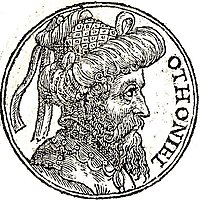Otniël

| The judges of Israel |
|---|
| Book of Judges |
Otniël , Otniel or Othniel ( Hebrew עָתְנִיאֵל) belongs to the judges of the Tanach or the Old Testament .
Biblical context
The story about Otniël can be found in Ri 3,7–11 EU , and thus Otniël is the first judge figure in the Old Testament. Otniël is also mentioned in Jos 15.17 EU and Ri 1.13 EU in connection with campaigns of conquest. In connection with a genealogy, Otniël can be found in 1 Chr 4,13 EU and 1 Chr 27,15 EU . In all cases the connection to his father Kenan and his brother Kaleb is established.
In the context of the report of the conquest of the Israelites (Jos 15: 16-19 = Judg 1.12-15) it is told how Caleb promised his daughter Achsa to the conqueror of the city of Kirjat-Sefer . Otniël conquers the city and receives Achsa as his wife. However, since he was only given “arid southern land”, she asked her father for a more fertile piece of land as a dowry. In the book of judges Otniël is referred to as a Judean in this context . This makes him the only judge from what would later become the southern kingdom of Judah .
As a judge, Otniël functions in a specific scheme that runs through the entire book of judges . The apostasy of YHWH to the foreign gods is followed by the punishment of YHWH in the form of a threat from a hostile neighboring people, the call for help of the oppressed people to YHWH and the election of a savior (called a judge) by YHWH, who is to save the people of Israel . In Otniël's case, the enemy is Kushan-Rishatajim. After eight years of forced labor YHWH Othniel elected savior who can ultimately defeat the foreign power. According to the scheme of the Book of Judges, there is now a time of peace that lasts here for forty years, during which the people maintain their loyalty to their God YHWH. Otniël's story simply ends with the note of his death.
Historical classification
Otniël's enemy in Ri 3.7–11 EU Kushan-Rishatajim (כושן רשעתים= "Kushan of double malice"), a king in the Aram-Naharaim area (ארם נהרים), cannot be associated with any known historical ruling figure. Together with the schematic representation of the judge's narrative, it can be assumed that it was created within the framework of the Deuteronomic History . The figure of Otniël, taken from the land acquisition report, is placed in front of the reports on the other judges from the northern Reich of Israel .
Impact history
Otniël is mentioned in the 3rd century by Rabbi Abbahu , who praised him for his establishment of the halacha .
literature
- Stefan Beyerle: Othniel. In: Biographisch-Bibliographisches Kirchenlexikon (BBKL). Volume 6, Bautz, Herzberg 1993, ISBN 3-88309-044-1 , Sp. 1336-1339.
- Heinz-Dieter Neef: Otniel. In: Michaela Bauks, Klaus Koenen, Stefan Alkier (Eds.): The Scientific Biblical Lexicon on the Internet (WiBiLex), Stuttgart 2006 ff.
Individual evidence
- ↑ The Hebrew text describes Achsa as the acting person who first urges Otniël to ask her father for a piece of fertile land and then makes this request to her father himself. According to the Septuagint and Vulgate, Achsa is urged by Otniël to ask her father, which she does. At this point, the German-language Bible translations make different decisions as to which text template to follow. Martin Luther's translation and the standard translation follow the Septuagint.
- ↑ Martin Luther translated Mesopotamia here and thus follows the translation of the Septuagint .
- ^ Heinz-Dieter Neef: Otniel. In: Michaela Bauks, Klaus Koenen, Stefan Alkier (Eds.): The Scientific Biblical Lexicon on the Internet (WiBiLex), Stuttgart 2006 ff.
| predecessor | Office | successor |
|---|---|---|
| Joshua | Judge | Ehud |